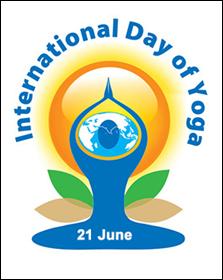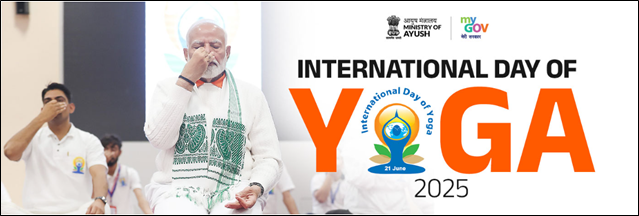Social Welfare
India’s Timeless Gift to the World
Yoga for One Earth, One Health
Posted On: 14 JUN 2025 10:09AM
|
By practising yoga, a spirit of oneness is created—oneness of the mind, body and intellect, oneness with our families, with the society we live in, with fellow humans, with all the birds, animals and trees with whom we share our beautiful planet... this is yoga.
-Prime Minister Narendra Modi
|
Malli Mastan Babu, born in a small village in Andhra Pradesh, rose from humble beginnings to become one of India’s most inspiring mountaineers. Alongside his academic success in engineering and management, he discovered a passion for climbing and prepared through intense physical and mental training. Yoga played a vital role in his journey. It helped him build strength, stay focused, and remain calm during extreme conditions. His discipline was remarkable from preparing his own meals to carefully planning every step of his climb. In just 172 days, Babu climbed the highest peaks on all seven continents, becoming the first Indian and South Asian to achieve this feat. His story is a powerful reminder that inner balance and determination can help us reach the greatest heights. His life continues to inspire strength, clarity, and peace in our pursuit of holistic well-being.

India’s ancient civilisation has always stood for knowledge, wellness, and harmony. From the discovery of zero to contributions in astronomy, surgery, and philosophy, India has enriched the world for centuries. Rooted in the ideal of Vasudhaiva Kutumbakam, the world is one family. This wisdom reflects the belief that true progress lies in the collective upliftment of humanity.
Among India’s greatest gifts to the world is Yoga. More than physical exercise, Yoga is a way of life, offering mental clarity, emotional stability, and spiritual peace. Its relevance is especially strong today, as the world embraces a shared vision of wellness that promotes harmony between people and the planet.
Due to the relentless efforts of Prime Minister Shri Narendra Modi, the United Nations General Assembly declared 21st June as International Yoga Day, recognising Yoga’s holistic approach to health and balance in life. This marked a global shift toward preventive healthcare rooted in India’s ancient wisdom.
Derived from the Sanskrit root yuj, meaning “to unite,” Yoga integrates body, mind, and spirit. Codified by Maharshi Patanjali in the Yoga Sutras, it outlines eight limbs that guide ethical living, discipline, and inner calm.

In today’s fast-paced world, where stress, digital overload, and emotional fatigue are common, Yoga serves as a powerful tool for self-restoration. A daily practice enhances posture, boosts immunity, and promotes emotional stability. Especially during the Covid-19 pandemic, it proved vital for mental and physical resilience. Recognising its value, the World Health Organization included Yoga in its Global Action Plan on Physical Activity 2018–2030.
Since its inception in 2015, International Yoga Day has grown into one of the world’s largest health movements, setting historic milestones each year. IYD 2024 saw greater engagement, with approximately 24.53 crore participants. Outreach was extended through community radio, schools, Anganwadi centres, and government departments. Social media engagement reached over 3.48 crore people, while Indian embassies and institutions connected with more than 5.45 lakh individuals globally. These milestones reaffirm Yoga’s role as a global bridge for wellness and unity.
Under the leadership of Prime Minister Modi, the Government of India has taken significant steps to institutionalise Yoga across sectors. The Ministry of AYUSH has spearheaded campaigns to promote Yoga worldwide, allocating ₹15.30 crore to support research projects in educational, wellness, and medical institutions. The Yoga Certification Board has set global standards and facilitated recognition of qualified Yoga professionals.
India is sharing Yoga with the world in many ways. It has set up AYUSH Chairs in universities abroad and runs workshops through Indian embassies. Digital campaigns and apps like Y-Break and Digital Infrastructure for Knowledge Sharing (DIKSHA) help people include Yoga in their daily lives, especially at work and school.
Yoga is also a big part of the government’s mental health support for students. Through the Manodarpan programme, Yoga is combined with counselling to help students feel better. Since 2020, Yoga sessions have been shown on 12 TV channels for children from Class 1 to 12.
Yoga’s popularity is creating new jobs and businesses too. More people are visiting places like Rishikesh, Kashi, and Kerala to learn Yoga. Airports, hotels, and wellness centres now offer Yoga facilities. There’s also a growing market for Yoga clothes, equipment, trainers, and workplace wellness programmes. Yoga is becoming a part of everyday life and work.
Rooted in ancient wisdom, Yoga offers balance in a world of constant change. It fosters strength, clarity and connection within individuals and across the planet. As a symbol of India’s soft power, Yoga transcends borders and cultures, promoting peace, wellness and unity. It reflects India’s ability to inspire global harmony through knowledge, tradition and timeless values.
References:
***
Download in PDF
Santosh Kumar/ Sarla Meena/ Anchal Patiyal
(Features ID: 154650)
Visitor Counter : 19
Read this release in:
Hindi